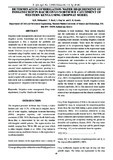| dc.contributor.author | Odhiambo, K O. | |
| dc.contributor.author | Basil, T. | |
| dc.contributor.author | Kanda, E. K. | |
| dc.date.accessioned | 2022-09-19T11:31:11Z | |
| dc.date.available | 2022-09-19T11:31:11Z | |
| dc.date.issued | 2022-08-26 | |
| dc.identifier.uri | https://www.kalro.org/www.eaafj.or.ke/index.php/path/article/view/550 | |
| dc.identifier.uri | http://ir-library.mmust.ac.ke:8080/xmlui/handle/123456789/2067 | |
| dc.description.abstract | Irrigation water management is necessary for a successful irrigation system. Knowledge and tools on irrigation management is thus a requisite for profitable and sustainable use of the scarce water resources in Kenya. The study determined the irrigation water requirement of tomato (Solanum lycopersicum L.) crop in Rachuonyo catchment using CropWat model and the area climate, soils and tomato crop data. The study findings indicated that crop evapotranspiration (ETc) and net irrigation water requirement (IR) of tomatoes in the study area was 584.0 mm season-1 and 340.7 mm season-1 , respectively. The seasonal water requirement for tomatoes growing in a smallholder farm of 0.607 ha farm in the area was found to be 2,297.97 m3 season-1. The study revealed that CropWat model coupled with accurate area climate, soils and crop data can be used as a reliable decision support tool for the management of irrigation water for the region. | en_US |
| dc.language.iso | en | en_US |
| dc.publisher | East African Agricultural and Forestry Journal Special Issue | en_US |
| dc.subject | Determination, Irrigation Water, Requirement, Tomato, Crop, Rachuonyo North, Sub Catchment, CROPWAT, Model | en_US |
| dc.title | Determination of Irrigation Water Requirement of Tomato Crop In Rachuonyo North Sub Catchment of Western Kenya Using CROPWAT Model | en_US |
| dc.type | Article | en_US |

